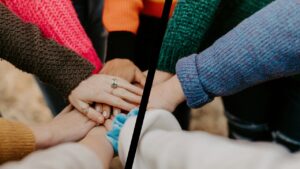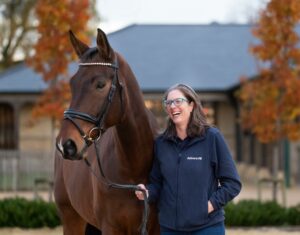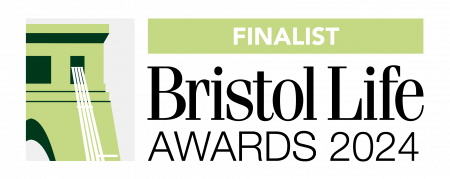We all love to hear about those that are at the top of the sport, our heroes who make the Olympic teams, those who live and breathe dressage. However, if the pandemic has taught us anything it’s that there are everyday superheroes all around us. Key workers who are doing long hours and getting up ridiculously early to muck out in the dark, those who are keeping our country going whilst still reaching major milestones in the dressage world whether that be at grand prix or prelim level.
We wanted to bring you the stories of these real heroes of British Dressage and if you are one of them or know someone who you believe should make the list, we’d love to hear from you.
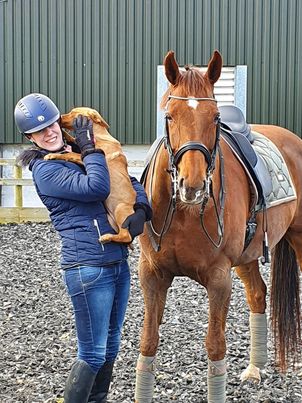
Helen is the surgical and resuscitation lead for a private hospital and currently competes at Elementary on her horse Diva.
What is your job and how has it changed during the pandemic?
I am the surgical and resuscitation lead for a private hospital. I’m theatre based and previously we ran theatres for private patients.
During the pandemic we have been operating on behalf of the NHS and doing important surgery that cannot wait for the pandemic to pass such as cancer and sight saving surgery. The way we work has changed, we are wearing full PPE to care for our patients and we are caring for sicker patients than previously.
Our teams have suffered personally from Covid-19 and colleagues have lost loved ones. Regardless of huge personal loss amongst my team, they have stepped up and continued to care for patients in the most dedicated manner. They have learnt new procedures, new clinical skills and maintained top class patient care.
Tell us a bit about your horse. What have you achieved? What are you working towards?
I am privileged to have a lovely horse called Diva (affectionately called Dave when she is naughty). We compete together at BD elementary level which is a new level for us both this year.
Prior to lock down, I was having lessons with Rhett Bird whose patience and logic has really helped us make progress and we are extremely grateful for his wisdom. I was thrilled to have qualified for Petplan Equine Area Festivals this year, but shall sit tight and have another go next year.
How do you cope with juggling work, life and horses during the pandemic?
During the pandemic things changed significantly for me at the beginning. I’m a single mother to a 12 (13 next week!) year old daughter with underlying health issues. I sent her to live with my parents for the first lockdown as I was concerned about my front line role and the risk it posed to her. I am extremely grateful to my parents and my daughter for their help and support. She acted maturely during a difficult time and my parents engaged with her education online which was technologically challenging at times. Once I was confident in the efficiency of my work PPE, my daughter came home after several months with my parents.
Juggling the last year has been a challenge. I’ve been found riding late at night or at silly o’clock in the morning around work. I’m lucky to have my horses at the most supportive livery yard – Leys Farm Livery and am grateful that their careful management and slots for us to visit and ride has allowed me to carry on riding in a safe and sensible manner.
I don’t think it’s easy to juggle it all, and sometimes it would be easier to not ride at night in the rain – but it is very good for me to have a hobby that takes my full concentration and allows me to relax and do something entirely different from work. It’s a privilege and I can’t wait to get out and about training and competing again.
Milla Stevens
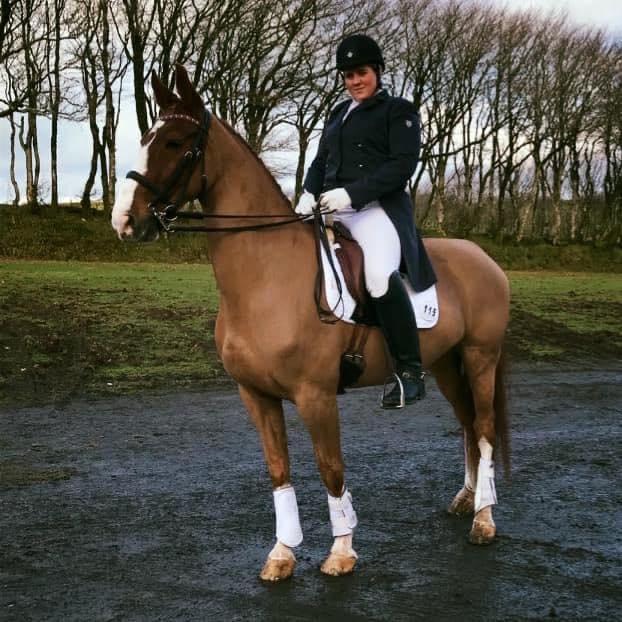
Milla is a lorry driver who owns two horses, Angelica and Perianth and competes at Advanced level.
What is your job and how has it changed during the pandemic?
I am a lorry driver working for my fiancé’s business delivering grain for animal feed and also hay and straw to farms across the South West. My job hasn’t actually changed too much during the pandemic, I have been busy working 70 hour weeks throughout.
Tell us a bit about your horse. What have you achieved? What are you working towards?
I did my first advanced test at the start of the year on my home produced mare, who I bought as a feral 4 year old, she is 10 this year. It was a massive achievement for me to have finally got to wear my tailcoat and even more special with it being a horse I know I have produced myself alongside working long hours.
My aim for her is to get to Grand Prix, so we are training hard with that in mind!
How do you cope with juggling work, life and horses during the pandemic?
I am fortunate that my fiancé also farms so I am able to keep the horses at home, which is the only way I can do it. I’m not sure any livery yard would be okay with me mucking out at 3.30 am!
I often start work between 4 and 5 am, the horses are mucked out and turned out before then, and I often end up doing a 15 hour day, so might not be home before 8pm to bring them in. I then ride in the evenings, my poor fiancé is very tolerant of me being out of the house for 18 hours a day! I use my 45 minute compulsory driving break during work to go for a run and keep my fitness levels up to help with my riding.
How does riding make you feel? Why do you do it?
Riding makes me feel incredibly proud and excited, I think the joy of producing my mare myself has been lots of little milestones reached.
I do it because I absolutely love the sport, I love the partnership you get with a horse when you’re training together and I am determined to ride at Grand Prix, having done one advanced test in my tailcoat I want to do it again!
Alicia Griffiths

Alicia is a pensions/ payroll officer alongside this she is a para rider who competes for Team GB on her horse Darcy.
What is your job and how has it changed during the pandemic?\
I’m a Pensions/payroll officer for the North Bristol NHS trust and things have changed a lot in my job. From being 9-5 workers offering pension clinics, we’re now shift workers to be Covid-19 compliant in our offices.
This has meant a massive change to working relationships. You don’t see everyone as you’re on different shifts and we’re doing a lot more work through Microsoft Teams which is something we’ve had to adapt to as at the beginning of the pandemic we didn’t have any way of home working in the department.
Covid-19 has massively impacted our work, in my opinion it has driven more to look to retirement and more people are retiring than in previous years. This could be in response to an ageing population, but I honestly think Covid-19 is the driving force behind this.
As well as this, we are also recruiting more retire and return people back: nurses, doctors, ect. that are staffing vaccination centres and nightingale hospitals. We’ve also had to deal with death in service owing to Covid-19 – that’s not very nice for anyone.
Tell us a bit about your horse. What have you achieved? What are you working towards?
I’m a blind para rider and I compete for Team GB with my horse Darcy who is a 9 yr old ISH who I’ve had for two years.
I’m on the Podium Potential Pathway and we started competing at 2* last year with aims for 3* if I can sort her changes to be less expressive! I’d also like to compete in able-bodied Advanced Medium and Prix St George later this year.
How do you cope with juggling work, life and horses during the pandemic?
I have a hugely supportive family and great friends. I’m lucky I have a yard manager who turns out, brings in and skips out. Everyone helps aid the dream.
It’s often riding at strange hours to fit around work and home life which includes homeschooling my three children. I’m often up at the yard at 6am riding at 6:30 and then at work by 8 or riding when work has finished at 7:30/8pm.
How does riding make you feel? Why do you do it?
I think the horses have helped keep me sane during the pandemic – I love it.
Rachel Collins
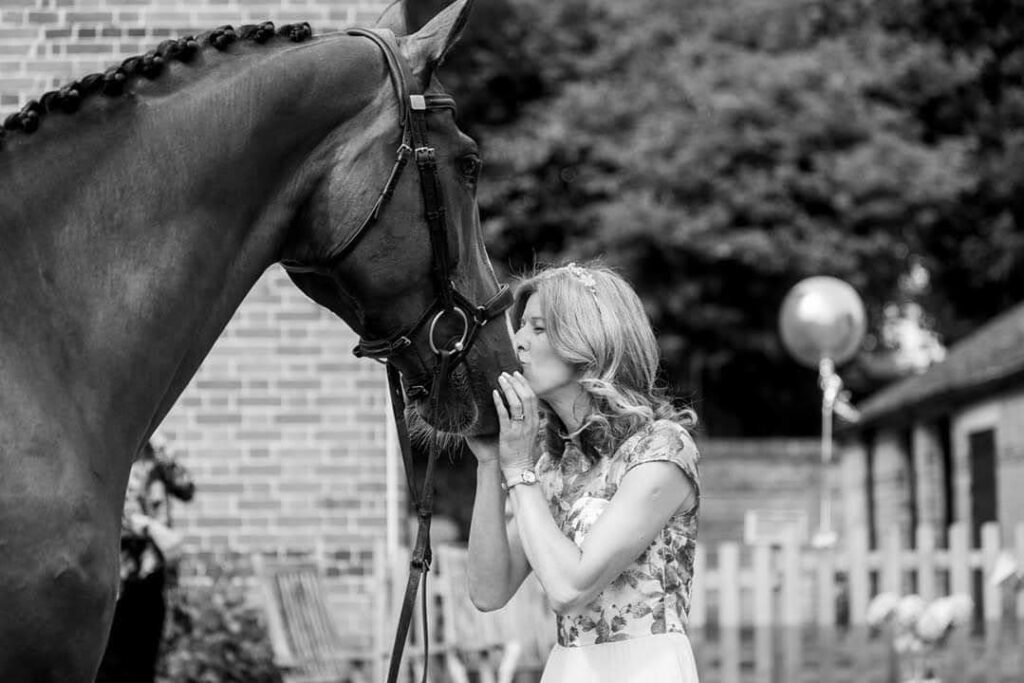
Rachel leads an affordable housing construction team and competes at Medium level dressage and International 3* level para dressage with her horse Muddy.
What is your job and how has it changed during the pandemic?
I am a Key Worker and have worked throughout the pandemic. I lead the affordable housing construction team at Dover District Council, and have been working from home and out on construction sites all the way through.
Tell us a bit about your horse. What have you achieved? What are you working towards?
I have always been horse mad, but I spent much of my childhood in foster care and had to wait until I was 30 before I could afford my own horse. I am 49 now, and in 19 years I certainly have made up for lost time! I’ve competed in show jumping, eventing, team chasing, I’ve even ridden in an amateur flat race on my ex-racer, but my love now is dressage.
I have been disabled since birth, I have a condition called AMC, or arthrogryposis. As a result I have deformities to both of my legs, my right hand and arm, and my spine. I compete at medium level and since 2014 I have also been competing in para dressage where I currently compete at International 3* level with my absolutely gorgeous horse Fine-time, or Muddy, as we know him. He is a 17.2 liver chestnut Rhinelander gelding. He is the sweetest boy, and always makes me smile.
My other International horse Ronja is on loan to a young rider who has just started on her para journey.
How do you cope with juggling work, life and horses during the pandemic?
Dover DC is an excellent employer and they are very flexible about my training and competing. I ride every evening after work at the moment. We have a strict rota for the yard during lockdown and it’s so quiet, which is so odd, as it’s such a friendly yard and in normal times we would be there together, supporting each other and generally having a laugh. My trainer David Rumsey lives at the yard, so I have been able to have regular lessons thankfully.
In July I married my partner of 15 years in a lockdown wedding. We could only have a few guests, but Muddy was the guest of honour! He was such a good boy for the photos.
In October, Keysoe CPEDI3* was able to run, which was incredible. We had a great time, and it felt like normality was returning. Of course, it wasn’t and now we are back in lockdown. I was aiming for the Elementary Regionals and Medium Areas, and aiming for my first overseas International at Waregem or Deauville, these now seem unlikely, but if we all lockdown and pull together, normality will return soon.
Jenny Folman
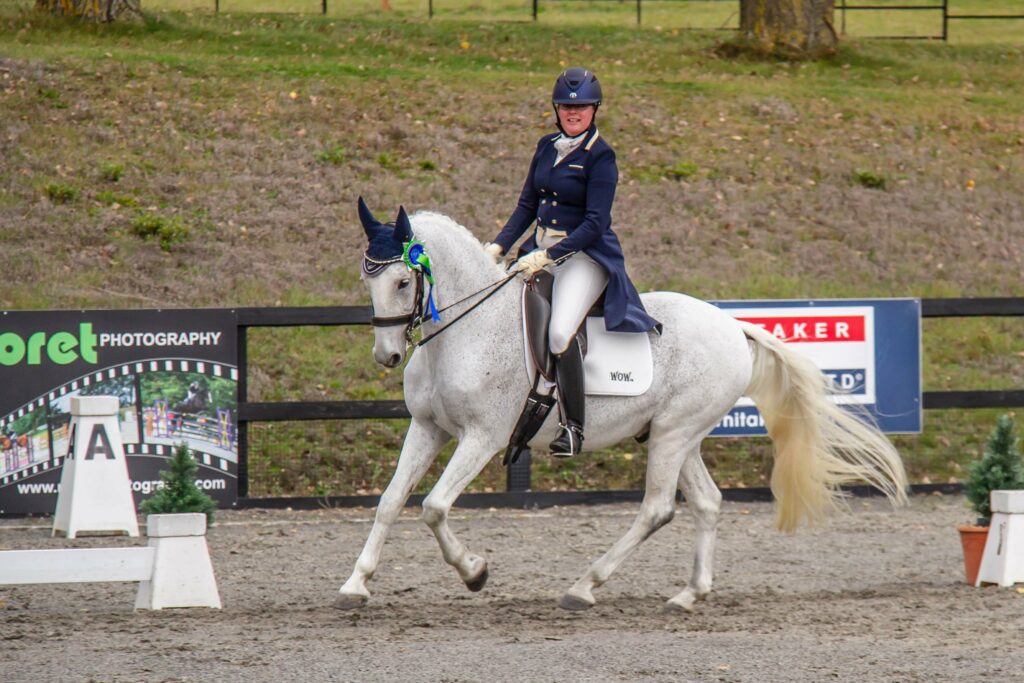
Credit Mountain Photography
Jenny is an accountant, riding instructor and saddle fitter whose husband is a GP. They have their horses at home including Jenny’s competition horse Favory Gazdag.
What is your job and how has it changed during the pandemic?
My main job is a self employed accountant, I went self employed when I had my eldest child, who is now six, my youngest is four. I also teach dressage and fit WOW saddles, I really like mixing the two careers, horses are my love but accountancy pays the bills!
I normally work from home for my accountancy work, so that hasn’t changed with the pandemic, except the extra work in helping clients with furlough claims and advice on adjusting their businesses to cope etc. My client base is predominantly medical, so it did cause a bit more pressure this year with the tax return deadline, as obviously many of my clients were a bit more distracted than usual and not able to focus on tax returns as efficiently as they ordinarily would!
The horse work has been quite severely affected, I haven’t run any clinics at all this year, I have had to stop teaching and saddle fitting altogether during the first lockdown, and the industry remains a worry due to the looming recession.
My husband is a GP, air ambulance doctor, and deputy medical director for our local ambulance trust, so obviously there has been a huge change for him over the last year. He is now doing GP telephone consultations from home on average two days a week, and only one day from the surgery, whereas previously his three GP days would all be face to face from the surgery. The ambulance work from a strategic view is now all from home with online meetings and calls etc, and there have been times when demand has peaked and the service has been under pressure, which involves more input from the directorate from a management point of view. There have been times where he’s needed to help operationally too, by booking on duty with the control room to respond to jobs, either to relieve pressure in general or to provide high level clinical skills where needed.
Tell us a bit about your horse. What have you achieved? What are you working towards?
My competition horse is a 16yo Lipizzaner called Favory Gazdag, whom I bought as an unbacked 4yo from Hungary and have taken through the levels in dressage. I started 2020 with the aim of doing our first Grand Prix test together, and then lockdown happened and it seemed an impossible goal. Luckily I was working with Sarah Huntley at the time, a sports psychologist, and she helped me to stay focussed and stick to the plan, and over the summer we finally earned our first GP point together.
We managed to finish the year on a high too, with PB scores at Inter 2 and GP at the BD Northern show, and took champion in each, I was absolutely over the moon! So at the moment the work is on improving the weak areas at GP, with a view to improving our scores at the level further.
How do you cope with juggling work, life and horses during the pandemic?
This last year has required a high degree of flexibility and adaptability in terms of keeping the horses progressing and in work! Mostly it works well and we can juggle things, however there has been a few occasions where I’ve been in the middle of tacking up and he’s taken a call and looked at me apologetically before dashing off with blue lights flashing, and I sigh, untack, and stay at home with the children!
During the first lockdown we chose to keep our children at home as we were worried about the risk, with cases on the rise, so that was very tricky in terms of making sure we could both manage our workload and have time out and also keep my competition horse in work. We muddled through ok!
It helps a lot that the horses are at home so at least we don’t have the worry of access to a livery yard that some people have had. My husband really is a huge support and I think is my horse’s biggest fan, so he is very understanding and accommodating when it comes to finding time to fit in exercise and training. It is always tricky with such busy working lives and young children at the best of times, but it’s presented extra challenges in the pandemic.
How does riding make you feel? Why do you do it?
Riding is my happy space, I just love the bond and the relationship that comes with owning and training a horse. It constantly amazes me how they can learn such a complex and wide range of differing cues! My horse adores his work and has such enthusiasm and tries so hard, he makes me feel very humble. We have such fun together and know each other so well, he’s such a good friend and teacher.

